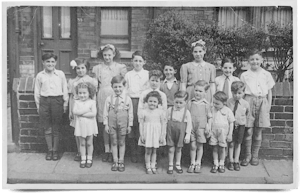Liesel Carter
Born in Germany, Liesel travelled alone at just four years old across Europe to Britain to escape from Nazism. She lost her father and many other members of her family at the hands of the Nazis.
“Mine isn’t a horror story. Mine’s happy, mine’s a happy story.”


Liesel was born into a middle-class family in Hildesheim, Germany in 1935. She has few memories of her life in Germany. Growing up, she was unaware that her father was beaten up in the streets by the Nazis and died in a concentration camp when she was only 18 months old.
In 1939, Liesel’s mother, Marthe, managed to secure a job as a domestic servant in Hull, but under the terms of her visa imposed by the British government, she was unable to take Liesel with her. Her mother’s employers worked tirelessly to find a way to get Liesel to safety in England. Arrangements were eventually made for Liesel to travel on a Nansen passport, an internationally recognised travel document issued to stateless refugees. This allowed four-year-old Liesel to leave Germany. She travelled alone through Germany, Sweden and eventually Norway, where she stayed for about a month with a Norwegian family.
Liesel lived with the Alfsens in Norway and later reunited with them in the 1980s. They recounted to her that they watched her walk up the gangplank of the ship that took her to England with her own doll and pram:



“We took you down to Bergen harbour and you wouldn’t let us pack the doll and pram and the last time we saw you was, you had a label round your neck, ‘My name is Liesel… I’m going to Newcastle.’”



Liesel was reunited with her mother when she arrived in England in January 1940. However, her mother’s job as a domestic servant meant Liesel could not live with her, so Liesel stayed in three different foster homes before moving to Leeds. Her foster family were unable to have children of their own and wanted to adopt her, but Marthe refused permission. Liesel’s mother remarried in 1944. Liesel stayed in touch with her mother, and they often spent the school holidays together in London, although they never lived together again.
Liesel lived with her foster family until she married her husband, Terry, in Leeds in 1958. They had a happy life together and had three children. In the 1980s, Liesel was working at Leeds University and her colleague, a professor of Scandinavian Studies, helped her to contact her Norwegian foster family. She eventually reunited with them in Norway.





Liesel lost many members of her family in the Holocaust. She knows very little about her grandparents and other family members. She learned that some of her cousins were killed in Auschwitz, and that an aunt and uncle committed suicide on the train taking them to Riga.
One of Liesel’s ambitions was to find out more about her father and visit his grave. However, she was always reluctant to visit Germany by herself. She visited Hildesheim in 1978 with her older daughter Helen, but felt uneasy being in Germany.
Liesel believes strongly in the importance of keeping the memory of the Holocaust alive in order to encourage young people to accept each other as equals, rather than making judgements based on race, religion or colour:




“Religion is an accident of birth. If you’re born in one house you’re Catholic, if you’re born somewhere else you’re Jewish.”
Liesel has taught her own children to be open minded and not to have any prejudices, and that she hoped that in the future there will be more tolerance towards creed and colour.
As an active member of the Holocaust Survivors’ Friendship Association, Liesel continues to speak regularly to school groups and visitors. She has been awarded a British Empire Medal (BEM) in the New Years Honour’s list for 2025 in recognition of her service to Holocaust Education and Remembrance.



Can you help us?
Without the work of charities like ours, stories like this one will be lost and forgotten. Please donate generously to ensure that this story can a force for good in the modern world.
- £
